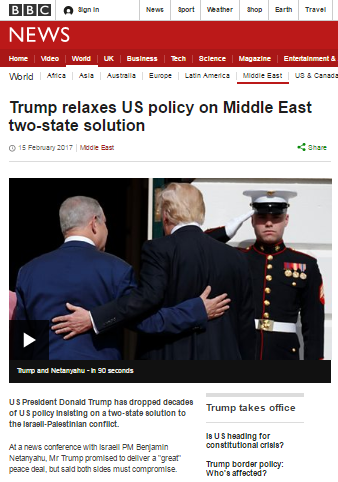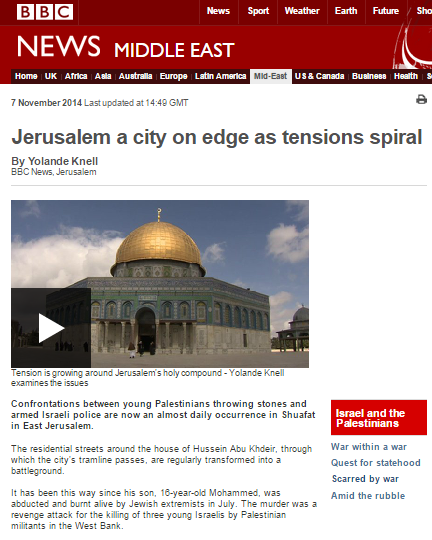h/t AO
In late December 2016 the BBC News website published an article that included an insert titled “What is the two-state solution?”
The original version of that explanatory insert amplified the Palestinian interpretation of the two-state solution as meaning a Palestinian state on all of the territory occupied by Jordan and Egypt between 1948 and 1967:
“A “two-state solution” to the decades-old conflict between Israelis and Palestinians is the declared goal of their leaders and many international diplomats and politicians.
It is the shorthand for a final settlement that would see the creation of an independent state of Palestine on pre-1967 ceasefire lines in the West Bank, Gaza Strip and East Jerusalem, living peacefully alongside Israel.
The United Nations, the Arab League, the European Union, Russia and the United States routinely restate their commitment to the concept.” [emphasis added]
As was noted here at the time:
“…the BBC told its audiences that various international bodies and countries are ‘committed’ to that concept when in fact the UN, the EU, Russia and the US in their ‘Quartet’ capacity support “an agreement that […] resolves all permanent status issues as previously defined by the parties; and fulfils the aspirations of both parties for independent homelands through two States for two peoples”. Those “permanent status issues” defined in the Oslo Accords of course include borders and Jerusalem.
Noteworthy too is the fact that the BBC’s portrayal of the two-state solution does not include the all-important phrase “two states for two peoples” – a definition which would require Palestinian recognition of Israel as the Jewish state.”
Later on, a change was made to the wording of that insert:
“At some point somebody at the BBC News website apparently realised that the phrase “on pre-1967 ceasefire lines” is problematic and in version 10 of the article that paragraph was changed to read:
“It is the shorthand for a final settlement that would see the creation of an independent state of Palestine within pre-1967 ceasefire lines in the West Bank, Gaza Strip and East Jerusalem, living peacefully alongside Israel.” [emphasis added]”
On February 15th the later version of that insert reappeared in two BBC News website reports:
“Israel-Palestinian conflict: Two-state solution not only option, US says“
“Trump relaxes US policy on Middle East two-state solution“
The following day it was found in two additional articles titled “Israel-Palestinian conflict: UN warns Trump over two-state reversal” and “Israel-Palestinian conflict: US ‘thinking outside box’“.

The BBC’s decision to reuse that insert in the same format raises additional points.
1) The claim in the first paragraph that the two-state solution is the “declared goal” of Palestinian leaders is inaccurate and misleading because it does not clarify to BBC audiences the repeated refusal of Palestinian Authority leaders to recognise Israel as the Jewish state – a necessary condition for fulfilment of the concept of “two states for two peoples”. That claim also of course conceals the fact that Hamas and additional Palestinian factions reject the two-state solution outright.
2) The reference to ‘East Jerusalem’ conceals the fact that – as the BBC itself reported in 2003 – the text of the ‘Roadmap’ compiled by the United Nations, the European Union, the United States and Russia (the Quartet) defines the two-state solution as including:
“…a negotiated resolution on the status of Jerusalem that takes into account the political and religious concerns of both sides, and protects the religious interests of Jews, Christians, and Muslims worldwide…”
As we see, an insert ostensibly intended to help BBC audiences understand the concept of the two-state solution in fact fails to provide the full range of information necessary for that aim to be achieved.



